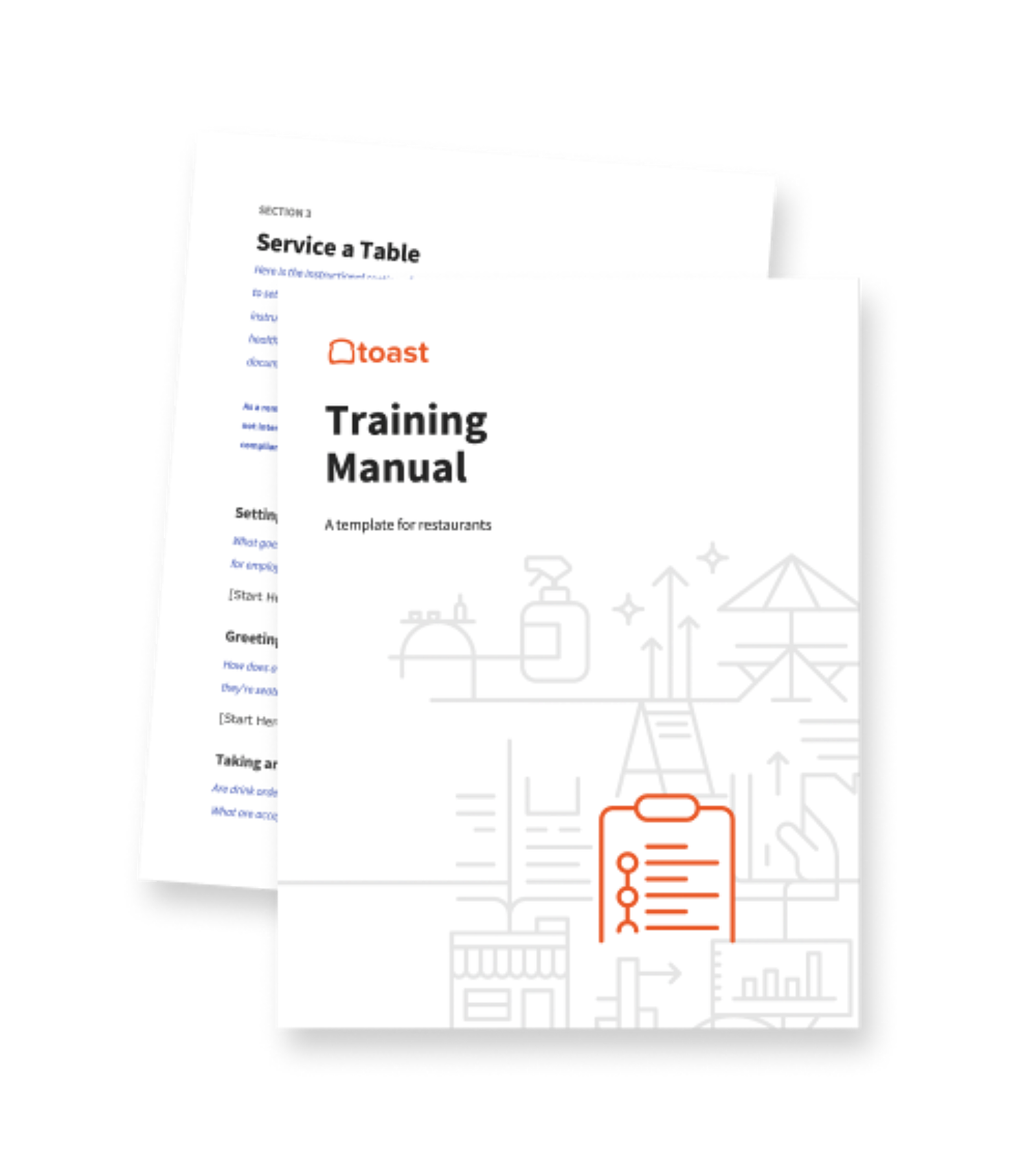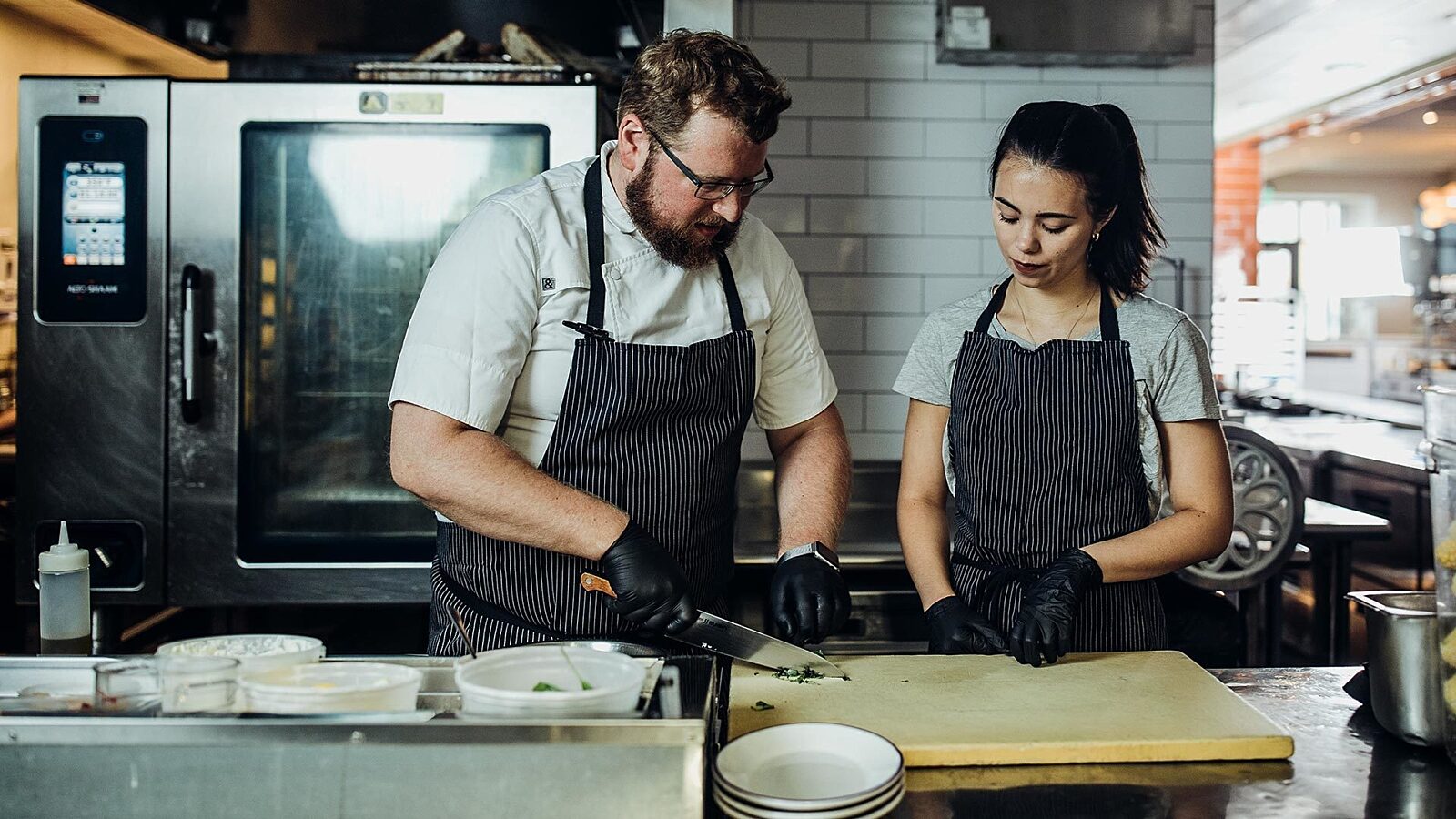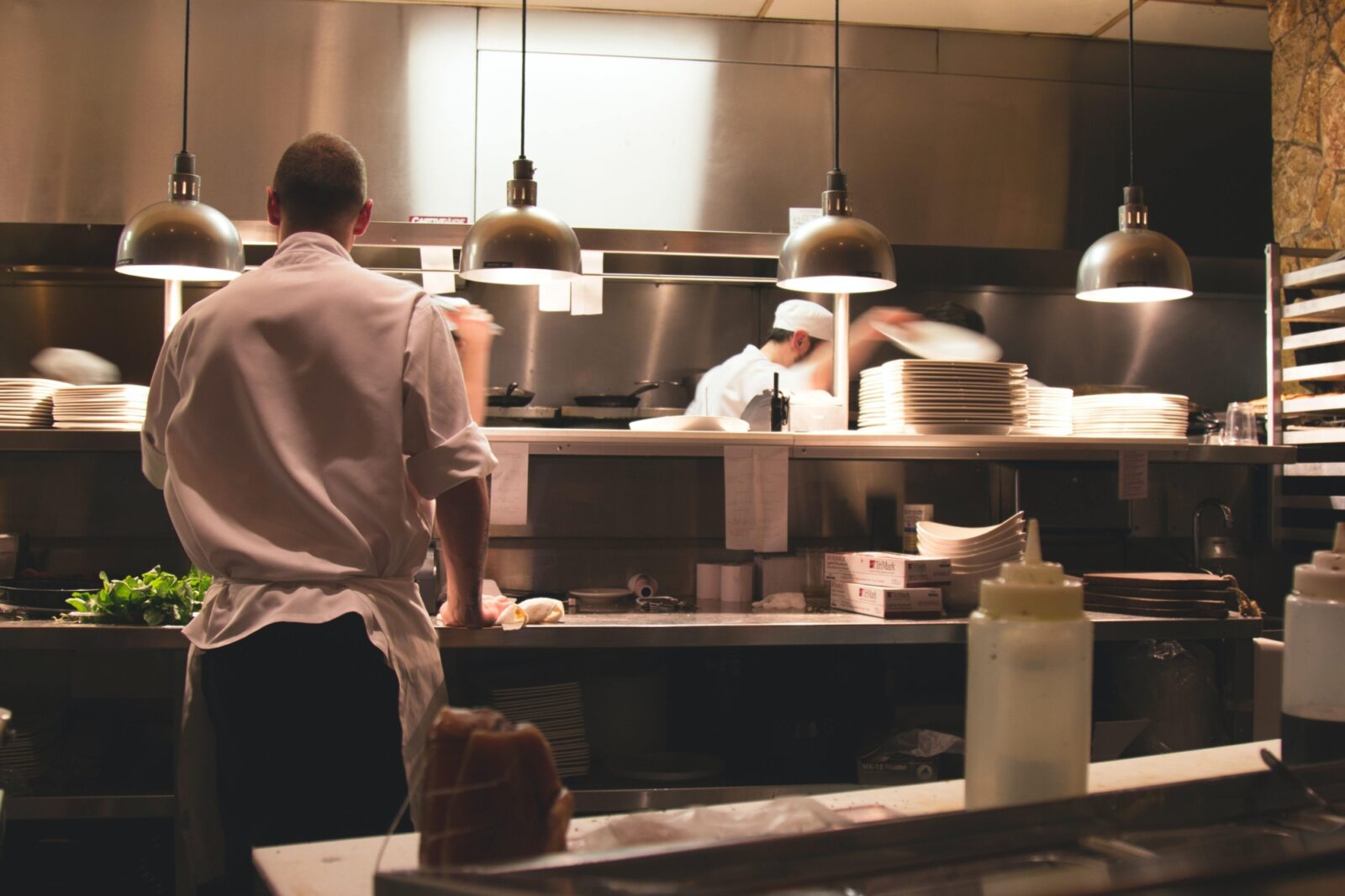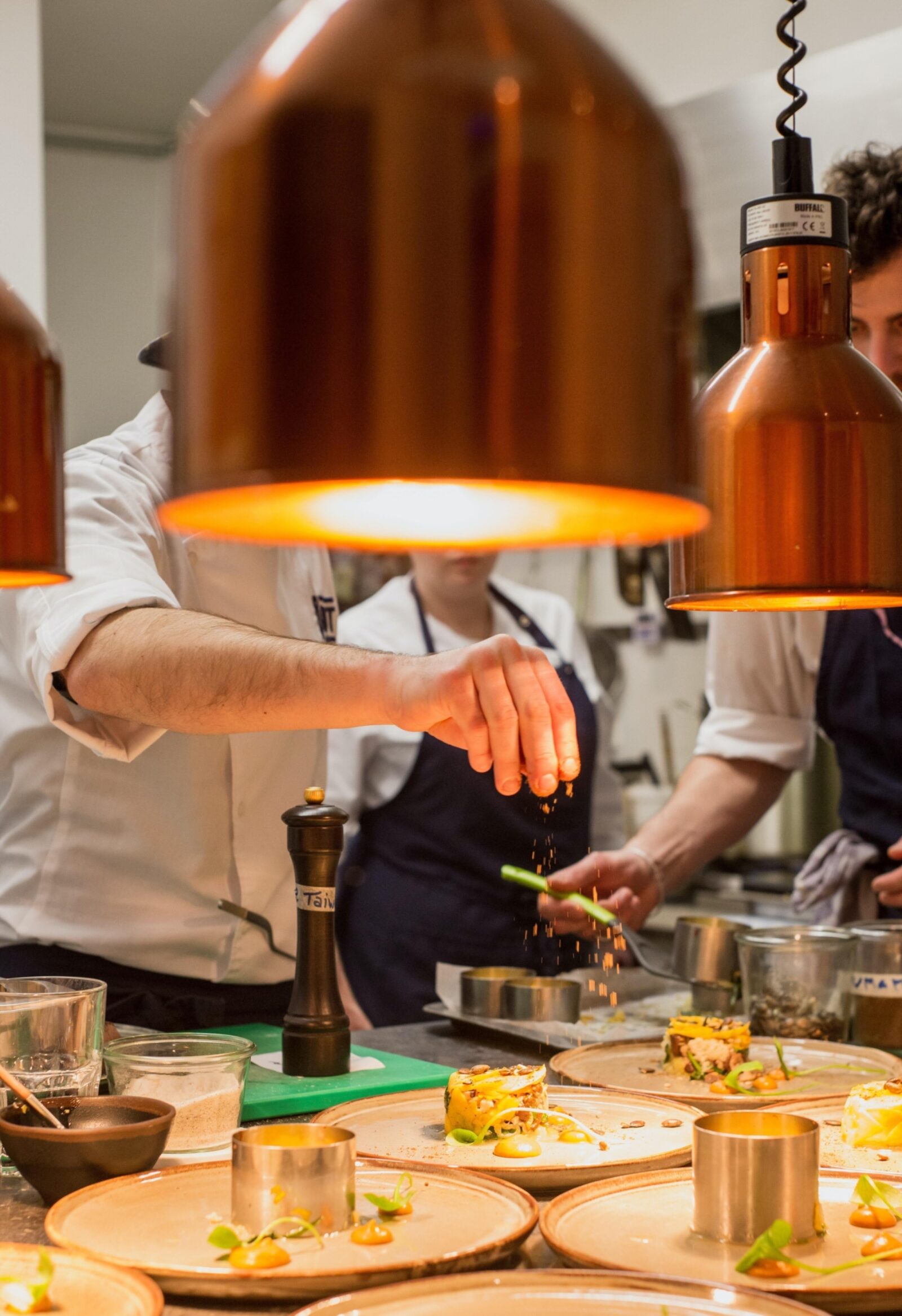
How to Help Improve Restaurant Hiring with Critical Employee Research
Boost hiring practices and retention rates with Toast’s timely new research on restaurant employee behaviors, motivations, and intentions within the industry.

Justin GuinnAuthor


Training Manual Template
Use this restaurant training manual template, a customizable Word Doc, to provide your staff with the rules, guidelines, and clarity they need to do their jobs efficiently.
Get free downloadThe success of a restaurant relies heavily on the quality of its staff — which means restaurant hiring is critical for success.
Hiring restaurant staff with the necessary skills, experience, and personality can make all the difference in delivering exceptional dining experiences and creating a positive work environment.
To better understand restaurant employee preferences and behaviors, Toast conducted an online blinded survey between February 27, 2023 - March 19, 2023 of 1,011 current restaurant employees.
Toast is the point of sale system built for restaurants.
Read on to learn key insights from our research on restaurant employee preferences and behaviors. See how these findings can help optimize your restaurant hiring practices, from how to find restaurant workers, how to hire restaurant staff, strategies for integrating new members into the team, and utilizing tools to streamline employee management.
Key findings on restaurant hiring and job searches
Most new employees have discovered their latest restaurant jobs through friends (55%) or social media (50%) — with new QSR team members being much more likely to discover their job via social media than their FSR counterparts (56% QSR / 45% FSR)
Experience is abundant in the industry — as 71% of restaurant employees have worked at a restaurant prior to their current job
Nearly a third (30%) of restaurant employees work across multiple locations for their employer — rising to 44% of employees at QSR establishments
Most restaurant employees (46%) are motivated by making money and supporting their lifestyle — while 18% of restaurant employees are motivated by career development and growth within the restaurant industry
Churn remains a problem, as 30% of restaurant employees are at risk of leaving the industry in the next 2 years — citing poor hourly pay (47%), not being recognized for hard work (44%), and bad managers (37%) as their top pain points today.
How do I find restaurant staff?
Toast’s research shows that most new employees have discovered their latest restaurant jobs through friends (55%) or social media (50%).
How do I hire people for my restaurant?
Start by finding great candidates, interviewing them and testing their skills, and then making a competitive compensation offer to seal the deal.
How to find restaurant workers
Finding top-quality restaurant workers requires a proactive approach and strategic recruitment tactics.
Our restaurant employee research shows that a majority of restaurant employees learn about job opportunities from referrals from friends (55%) and from social media (50%).
While it’s always important to act strategically depending on your restaurant type, the data shows that restaurant hiring best practices must include social media listings and encourage referrals from existing staff to their friends and extended network.
Here are a few other ideas to help source your open restaurant jobs:
1. Attend job fairs and culinary events
Job fairs and culinary events provide an excellent opportunity to connect with aspiring professionals in the hospitality industry. Set up a booth at local job fairs or participate in culinary competitions and trade shows to meet passionate individuals who are actively seeking opportunities in the field.
2. Collaborate with culinary schools and training programs
Establish relationships with culinary schools, hospitality programs, and vocational training institutes in your area. Consider offering internships, apprenticeships, or externships to students or graduates who are eager to gain practical experience. These programs can be a valuable pipeline for identifying and nurturing emerging talent.
3. Utilize online job boards and platforms
Take advantage of online job boards and platforms that cater specifically to the restaurant industry. There are few restaurant-specific online listing sites that may help attract talented professionals seeking career opportunities in the culinary world. Post detailed job listings and actively search for qualified candidates on these platforms.
How to hire a restaurant staff
Hiring a restaurant staff requires careful planning, thorough screening, and effective interviewing techniques.
Identify business need and detailed requirements for new team members
Before you start the hiring process, evaluate your restaurant's specific staffing needs. Determine the number of employees required for each position, including front-of-house and back-of-house roles.
You may consider factors such as peak hours, anticipated customer demand, and the size and concept of your establishment — as well as if it makes sense to mix part-time crew members with full-time staff.
Restaurant hiring managers can help encourage greater success by staying in tune with employee sentiment — both positive and negative amongst existing co-workers and throughout the food service industry.
Our data shows that 71% of restaurant employees have past experience in the industry.
Multi-location restaurant hiring managers that count on employees to work across various locations may want to consider if candidates are able and willing to work at different restaurant sites.
Craft compelling job descriptions that align with candidate goals
Write detailed job descriptions that accurately reflect the responsibilities, qualifications, and expectations for each role.
Highlight key requirements, such as relevant experience, skills, and any necessary certifications. Be sure to include details about the restaurant's culture, values, and unique offerings to help attract candidates who align with your vision.
You can also tap into common restaurant employees personas so that the open positions align with candidate desires. Toast’s research classified restaurant employees into four buckets based on their needs and desires within the industry.
Most restaurant employees (46%) are motivated by making money and supporting their lifestyle.
The second most common persona (22%) is motivated by saving money to achieve a future goal unrelated to the restaurant industry, such as paying for school or a new car.
There’s a sizable portion (18%) that are motivated by developing skills and sustaining a long-term career in the restaurant industry.
The final persona (14%) is motivated simply by keeping busy and making some extra cash to support lifestyle activities.
Consider creating your job descriptions to correspond with the characteristics that’d be most appropriate for the role and your restaurant environment.
Be thoughtful and practical with your restaurant’s interview process
Operators and managers may want to start the hiring process by inviting candidates for in-person interviews or conducting phone interviews.
Regardless of the channel, they may just want to get a feel for the candidate and assess factors such as their suitability for the role or their practical and cultural fit within the business. Consider preparing comprehensive questions in advance in order to assess their experience and relevant on-the-job skills.
Depending on the role, you can consider conducting skills assessments as part of the hiring process to gauge the quality of work.
For cooks, this could be a live cooking demonstration
Bartenders can make a few cocktails
Servers can work a (paid) test shift during a slow period to showcase people skills and more
These exercises may allow candidates to showcase their abilities, creativity, and attention to detail.
Think about how to make restaurant job offer standout from competition
Once you have identified the candidate who best fits the requirements, it may be time to extend a formal job offer.
According to our research, the top reasons restaurant employees switch jobs is due to bad managers, low pay, lack of recognition, and a lack of flexible schedules.
Take these insights into consideration with what you know about your ideal candidate. Together, they may help you craft an appealing offer.
For example, you may consider crafting an offer that provides multiple opportunities for financial incentives from base salary to performance incentives — which could be based in revenue growth, cost savings, guest satisfaction, employee morale, etc.
Likewise, having a rockstar manager may help attract candidates that left their last position due to poor management.
Importance of decreasing restaurant turnover rate and promoting employee retention amongst your staff
It’s critical that employers promote employee retention amongst restaurant staff members. This can look different from one restaurant to the next, though common helpful factors for retention can include a positive culture, generating more sales, and gamifying day-to-day tasks.
Our research highlights just how significant employee churn is in the restaurant industry.
Across the board, 40% of restaurant employees are somewhat or very interested in finding a new restaurant job — jumping significantly for mid-timer (52%) and long-term (50%) employees.
Be mindful of retention with onboarding plans for new restaurant staff
Even in the hiring and through to the onboarding process, restaurant hiring managers can be mindful of retention.
This can start by restaurant hiring managers ensuring they have thoughtful onboarding plans to help integrate new members into the staff. Onboarding plans can be a crucial aspect of building a strong team and for helping restaurant managers make their roles and employees more sticky — because it’s often not hard to find a new job.
Toast research highlights just how easy restaurant employees perceive potential job searches.
Two-thirds of restaurant employees that switched jobs in the past year said it was extremely easy or easy to find their latest job.
While this shows a great ease in the restaurant job search process, it’s not as easy as those restaurant employees that found their latest job one to two years ago.
To help encourage a streamlined and successful onboarding, restaurant owners, operators, and managers can take the time to introduce new team members to the staff, bring them up to speed on any restaurant technology, run through customer service expectations and food or drink menu callouts.
Depending on their role, you may also want to consider assigning them a mentor or shadowing partner to help them acclimate to the job and become comfortable with your restaurant's specific protocols.
Varying your hiring approach based on the roles may help attract more quality candidate
Best practices for hiring restaurant staff can vary depending on the role, experience required, and immediacy of the need. There are especially important nuances that need to be considered from one restaurant role to the next.
Let's explore differences and best practices when hiring different roles, from restaurant general managers, assistant managers, chefs, line cooks, bartenders, sommeliers, servers, hosts, and other front-of-house staff.
Hiring restaurant general managers and assistant managers
Restaurant general managers are often seen as key leadership roles that require a combination of management skills, industry knowledge, and strategic thinking. And assistant managers can be just as important in maintaining and promoting day-to-day expectations across restaurant staff.
It’s important to determine and clearly define expected qualifications and experience necessary for the role — which can typically include several years of experience in a supervisory or managerial role, strong leadership skills, financial acumen, and a deep understanding of the restaurant industry.
It's also important to nail your restaurant general manager's salary.
Critical experiences to look for in any restaurant manager can include demonstrating success in driving profitability, generating customer loyalty and a healthy stable of repeat visitors, and fostering a sense of community and retention amongst all staff members.
Hiring a chef, line cooks, and bussers for restaurant work
It’s important to clearly outline the specific culinary requirements for back of house team members — as well as how each role fits within the hierarchy of the kitchen. Determine the level of experience and expertise needed, as well as the ability to handle various types of cuisine, meeting volume demands, and maintaining high standards of food quality.
Consider factors such as candidates’ culinary training, previous kitchen experience, and their ability to execute relevant menu items.
Kitchen environments obviously usually require seamless communication and teamwork. During the interview process, you may want to assess relevant skills such as a candidate's ability to work collaboratively, respond well to feedback, and communicate effectively under pressure.
Definitely consider conducting things like taste tests to evaluate a candidate's culinary skills. This may allow you to assess their ability to create flavorsome, well-balanced dishes that align with your restaurant's concept and quality standards. If the role is for more of a prep cook, you may look less at taste and more at relevant skills like consistency and speed.
Finally, consider your budget for the chef salary and other kitchen roles.
Hiring restaurant bartenders
Depending on your type of bar or restaurant, it can be important for bartender candidates to have a strong knowledge of cocktails, spirits, and beer — but there's often much more to the job than that.
The best bartenders tend to also have excellent customer service skills, the ability to multitask efficiently, and a personable demeanor. Bartenders can often serve as a sort of therapist for bar goers — at least during the slower hours. You may also want to assess other relevant skills of any bartender candidates, like whether they can work well under pressure, keeping their cool while opening bottles, pouring drinks, and managing food orders for bar patrons.
Consider holding "auditions" where candidates can showcase their mixology skills to give you a better idea of their potential. And be sure to offer a competitive bartender salary in line with your area.
Hiring restaurant sommeliers
If your restaurant serves wine, it may be important to hire a skilled sommelier to help curate your wine list and provide guests with expert recommendations.
In general, sommeliers tend to have strong customer service skills, the ability to work well under pressure, and excellent communication skills to help guide your patrons in their wine selection — and the average restaurant sommelier salary accounts for all these skills.
You may want to look for candidates who have relevant skills, such as an extensive knowledge of different wine varietals, regions, and vintages, as well as the ability to pair them with food. You may also want to consider relevant past experiences and how prior markets and budgets will be applicable to your customer demographics and your wine, beer, and alcohol budget.
For example, somms at a high-dollar fine dining establishment may have a much higher budget to build their wine list and less cost-concerned customers — compared to a nice but not too fancy neighborhood restaurant that needs regional wines to balance value and taste.
Hiring restaurant servers and waitstaff
Servers and waitstaff are often the face of your restaurant, so you may want to search for candidates who are courteous, attentive, and professional — and be willing to pay the average server salary required for such talent.
For example, strong candidates may have relevant experience, demonstrate a solid understanding of the menu and all relevant ingredients, and the ability to stay calm and focused when dealing with difficult customers or high-pressure situations.
When interviewing candidates, consider asking for specific examples of how the candidate may have handled challenging customer service situations in the past.
Implementing restaurant employee and team management tools
Restaurant employee and team management software have grown increasingly popular in the industry.
Employee scheduling systems, payroll platforms, and other staffing tools can help streamline operations, improve communications, instill much-needed automations, and increase productivity.
Restaurant scheduling software can help optimize schedules weekly, daily, and even shift-to-shift, so that you always have the right balance of staff to customer traffic.
Payroll platforms built for restaurants can help streamline employee salary and wage distributions while also helping provide transparency and visibility into weekly labor costs, tip pooling breakdowns, payroll taxes, and deductions.
Toast is built to meet the needs of your business, from point of sale to scheduling, catering and events to payroll, cost control, and more. Learn more about how you can grow with Toast.
Methodology
Toast conducted a blind online survey of 1,011 U.S. restaurant employees not operating at a manager or owner level ages 18 and older between February 27 - March 19, 2023. Respondents were not made aware that Toast was fielding the study. Using a standard margin of error calculation, at a confidence interval of 95%, the margin of error on average is +/- 3%.
Forward-Looking Statements
This report contains forward-looking statements within the meaning of the Private Securities Litigation Reform Act of 1995, which are not guaranteed, and are subject to risks, uncertainties, and changes in circumstances that are difficult to predict. Forward-looking statements are based on our current expectations and assumptions, which may not prove to be accurate. These statements are not guarantees and are subject to risks, uncertainties, and changes and we assume no obligation to update or revise any forward-looking statement, except as required by law. Specific factors that could cause actual results to differ materially from forward-looking statements include, but are not limited to, the effect of economic conditions in the United States and globally, general industry conditions and the other important factors disclosed previously and from time to time in Toast’s filings with the Securities and Exchange Commission. Toast does not guarantee you will achieve any specific results if you follow any advice herein.
Is this article helpful?
DISCLAIMER: This information is provided for general informational purposes only, and publication does not constitute an endorsement. Toast does not warrant the accuracy or completeness of any information, text, graphics, links, or other items contained within this content. Toast does not guarantee you will achieve any specific results if you follow any advice herein. It may be advisable for you to consult with a professional such as a lawyer, accountant, or business advisor for advice specific to your situation.
Read More
Subscribe to On the Line
Sign up to get industry intel, advice, tools, and honest takes from real people tackling their restaurants’ greatest challenges.






